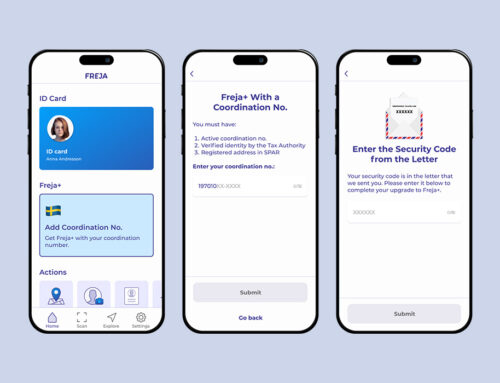Peace and security are often taken for granted, and it usually takes a tragic event like war to remind us just how fragile our way of life is. Events that were unthinkable just a few months ago are now filling the daily news all over a world that is already exhausted from a 2-year pandemic.
Unfortunately, there are people who prefer to take advantage of others in trying times such as these. Cyberattacks can occur in many forms, but their purpose is always the same: accessing protected data with malicious intent. However, with some basic preparation you can raise the level of protection for you and your family:
1. Have a Backup e-ID
An infrastructure such as an eID is critical for accessing public and private e-services. Therefore, make sure that you have redundancy and have covered yourself with having a backup.
Make sure that all of your family members have Freja+ installed on their phones so they can access 1177, Skatteverket and other critical services if other eIDs are temporarily unavailable.
2. Don’t Fall for Fake Password Reset Emails
If you reset your password frequently, you are probably familiar with the confirmation email that is part of the process. Cunning fraudsters take advantage of the fact that we reset our passwords often, so they send phishing emails cleverly disguised to look legitimate when in fact their purpose is to hijack your account.
This type of attack is very common, and users of the most popular services and social media in the world have fallen victim to this scam.
The best way to protect yourself, again, is to be vigilant. If you receive a request to reset your password or ‘verify’ your account but you have no recollection of initiating such a process, simply delete that email immediately – it’s a scam.
If you did but you are unsure or suspicious, do NOT click on anything. Rather, go to the official website of your service provider and reinitiate the process there just to be safe.
This is one of the reasons why we at Freja are such strong proponents of moving away from passwords and towards multifactor authentication, as passwords are a huge hassle and security risk for people.
3. Beware of Phishing
Although tracked phishing attempts peaked around 2015, they too tend to grow in times of crises. During the Covid-19 pandemic they jumped by as much as 220%, and, more worryingly, cyberattacks originating from Russia have jumped eight-fold since the beginning of February.
In essence, phishing is when a fraudster sends a fraudulent message intended to trick someone into revealing sensitive information rendering the victim more vulnerable to further cyberattacks, usually the victim’s email. Once the fraudster has access to that, they can proceed to cause much more harm to the victim.
Software has been developed to combat this type of cyberattack, but it is still best to be vigilant when dealing with suspicious emails.
4. Stay Informed with Säkerhetskollen
Säkerhetskollen is a service from Stöldskyddsföreningen that will keep you informed and up to date with the latest security risks going on in Sweden.
Make it a habit to go into the ‘Explore’ section in the Freja mobile app where the dedicated section for Säkerhetskollen is. There you will always find the latest news and security warnings from Säkerhetskollen regarding digital crime, cyber threats, fraud and scams.
Säkerhetskollen also has great articles with advice on how to stay safe online and various safety tips, perfect if you’re not sure where to start to feel safer online. You can also get personal help from them via chat or email.
Raising Security Awareness
What is also valuable is spreading awareness of Freja as a free, government-approved service that is a tool that can combat all the security risks mentioned in this article in one way or another. Be it multifactor authentication as an alternative to unsafe passwords, or as yet another option to access various e-services in Sweden, Freja can be an invaluable weapon against Internet fraud.
If you have any security concerns and questions related to eID the Freja team is always here to help you. Our support is open 8 –22 all days of the week. Also, please follow our blog here on the website for continuous updates and security recommendations.







